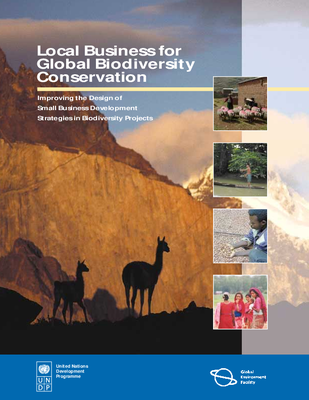Local Business for Global Biodiversity Conservation: Improving the Design of Small Business Development Strategies in Biodiversity Projects

This guidebook guides conservation planners and project designers through three main steps in designing local businesses aimed at conservation: (1) assessing the role of small businesses in conservation; (2) determining if small businesses can be socially, economically, and environmentally viable and sustainable; and (3) incorporating issues important to small business development, such as local regulations and resource rights, into the project design.
Key points in document
- This guidebook guides conservation planners and project designers through three main steps in designing local businesses aimed at conservation: (1) assessing the role of small businesses in conservation; (2) determining if small businesses can be socially, economically, and environmentally viable and sustainable; and (3) incorporating issues important to small business development, such as local regulations and resource rights, into the project design.
- The document offers detailed guidance notes on ecotourism and non-timber forest products.
- The guidebook does not provide lessons on enabling conditions based on enterprise case studies, though it does provide guidance on building the enabling conditions for conservation enterprises.
Information relevant to Learning Questions:
Are enabling conditions in place to support a sustainable enterprise?
- Stakeholder alignment, diversification
- Market demand, profit potential, access to credit/capital
- Business alliances
- Technical capacity
- Inputs, infrastructure
- Benefit sharing, biodiversity linkage, policies for and enforcement of resource use, planning for external disturbance
Does the enterprise lead to benefits to stakeholders?
- Increased income for participants
- Non-cash benefits
Do the benefits lead to positive changes in attitudes and behavior?
- Behaviors regarding sustainable use of resources
Does a change in stakeholders’ behaviors lead to a reduction to threats to biodiversity (or restoration)?
- Residential and commercial development
- Agriculture and aquaculture
- Biological resource use
- Human intrusions and disturbance
Does a reduction in threats (or restoration) lead to conservation?
- Forest ecosystems
- Freshwater ecosystems
- Grassland ecosystems
- Species

